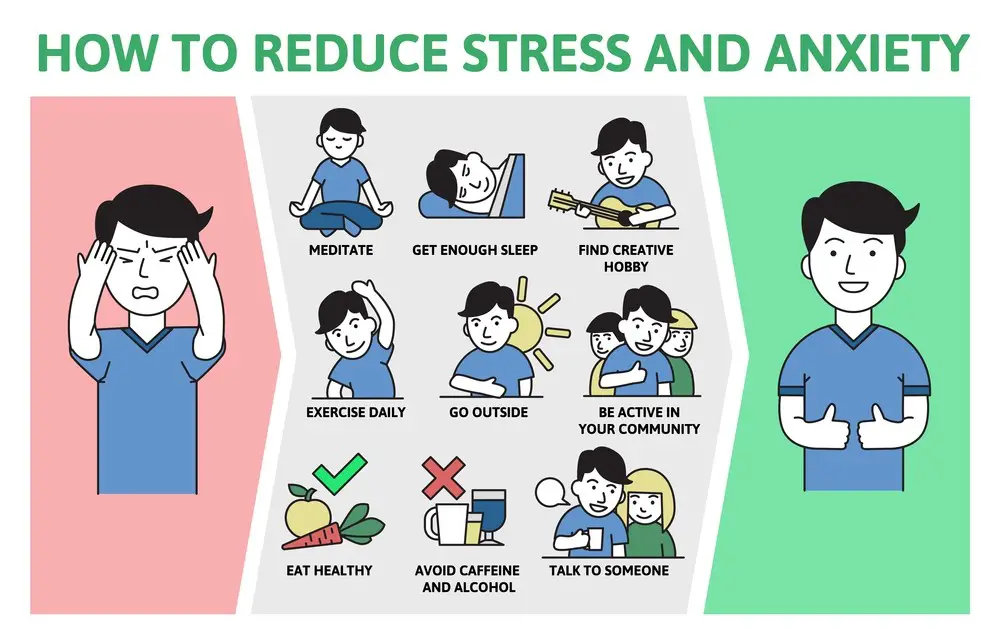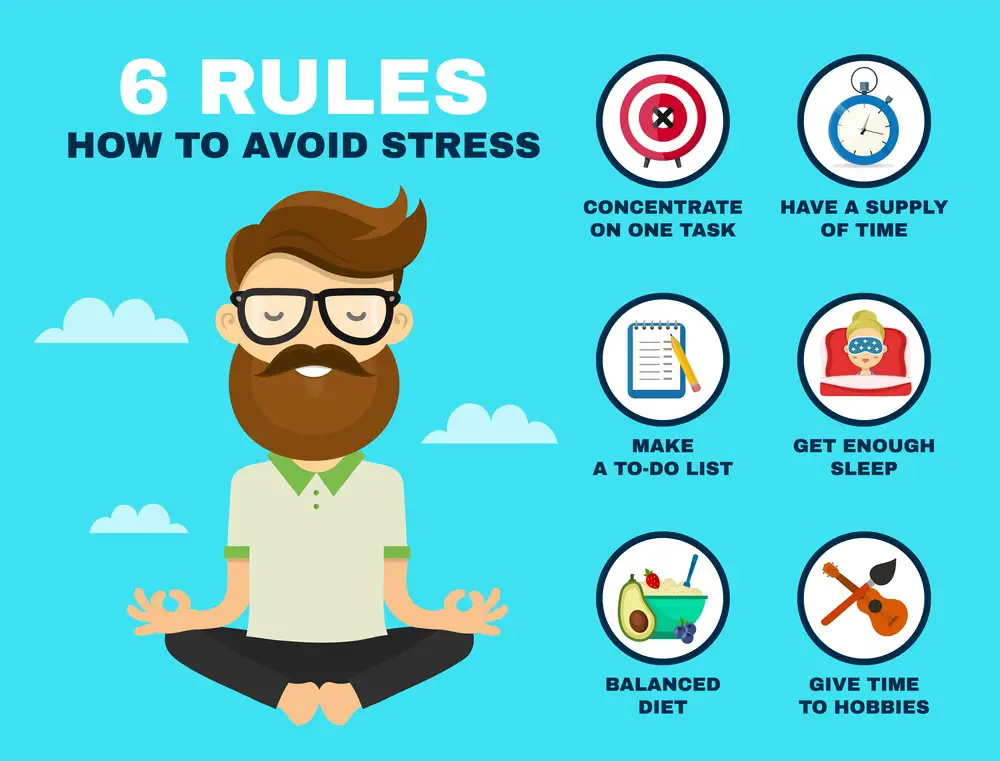As a BetterHelp affiliate, we receive compensation from BetterHelp if you purchase products or services through the links provided
Stress doesn’t just mess with your mind; it has a way of worming itself into your physical well-being. You might experience it as headaches, tense muscles, or even emotional upheaval like anxiety and depressive symptoms. Don’t forget your gut—stress can stir up various digestive issues, from nausea and diarrhea to constipation. While stress alone isn’t a ticket to colorectal cancer, it can up the ante when developing other gut issues like ulcers, colon cancer, and irritable bowel syndrome (IBS).
Understanding the multifaceted nature of stress—how it infiltrates both your mental and physical health—lays the foundation for exploring its possible connection to concerning symptoms like bloody stool.
Understanding Stress and Its Effects
Stress is our body’s physiological response to pressure or a feeling of emotional or physical tension. It is triggered when we face situations that we perceive as overwhelming or beyond our ability to manage. While stress isn’t directly related to colon cancer, it can affect our overall health, including our digestive system.
Understanding the different types of stress and their effects on our bodies allows us to manage our overall health better and mitigate potential digestive system issues.
What Is Stress?
There are two main types of stress: acute and chronic. Acute stress is a short-term reaction to an immediate threat or challenge, like a tight deadline at work. Chronic stress, on the other hand, is a long-term physiological response to a stressful situation or environment, which can lead to variable bowel habits and other gastrointestinal issues.
Chronic stress can disrupt the gut-brain connection, resulting in increased inflammation and a range of digestive issues, including diverticular disease, as well as mental health issues such as depression and anxiety.
Stress affects our bodies in various ways, causing physical symptoms like an increased heart rate and fatigue and emotional and cognitive symptoms such as irritability and difficulty concentrating. In some cases, stress may cause gastrointestinal issues that can lead to blood in stool. Comprehending the varied types of stress and their impacts on our bodies is key to managing health and mitigating potential digestive issues.
The Gut-Brain Connection
The gut-brain connection refers to the bidirectional communication between the gut and the brain, facilitated by millions of nerves, particularly the vagus nerve. This connection involves the transmission of signals between the digestive system and the central nervous system, impacting various aspects of health, including digestion, mood, and overall well-being. When we are stressed, this connection can be disrupted, leading to a variety of health implications.
Stress can have a considerable effect on the gut-brain connection. It can increase inflammation, interfering with gut and brain communication. This can cause a range of digestive issues, including irritable bowel syndrome (IBS) and mental health problems like depression and anxiety.
Stress-Related Gastrointestinal Symptoms
Stress can lead to various digestive issues, such as gastric ulcers, irritable bowel syndrome, and changes in bowel habits caused by stress. Some of these issues may result in blood in stool, causing concern and prompting further investigation.
Common Stress-Related Digestive Issues
Gastric ulcers, IBS, and stress-induced bowel changes are some of the most common digestive issues that can impact gastrointestinal health and cause stomach symptoms. Gastric ulcers occur when there’s a disruption in the mucosal lining of the stomach or small intestine, often causing abdominal pain and, in some cases, blood in stool. Stress can exacerbate the development of gastric ulcers by increasing stomach acid production, further irritating the ulcerated area.
Irritable bowel syndrome (IBS) is another stress-related digestive issue. It is characterized by abdominal bloating, pain, and variable bowel habits, such as constipation or diarrhea, which can affect one’s bowel movement. While IBS does not typically cause blood in stool, it can contribute to the development of other gastrointestinal issues like anal fissures, resulting in bloody stools.
Stress-induced bowel changes can also lead to digestive problems and bloody stool. When stressed, our bodies may respond by altering our bowel habits, causing either diarrhea or constipation.
 Blood in Stool: Causes and Concerns
Blood in Stool: Causes and Concerns
Various factors, including hemorrhoids, anal fissures, colon polyps, and blood clots, can cause blood in stool. Hemorrhoids are inflamed anal blood vessels that may appear as small bumps and can sometimes cause bleeding during bowel movements or when wiping. Anal fissures, on the other hand, are tears in the lining of the anus, usually measuring less than one centimeter.
Other potential causes of blood in stool include inflammatory bowel disease (IBD), such as ulcerative colitis or Crohn’s disease, and colon polyps, which are growths that form in the large intestine. While stress may not directly cause these conditions, it can contribute to their development or exacerbation by affecting the gut-brain connection and increasing inflammation in the digestive tract.
Seeing blood in stool can be alarming, but it’s essential to remember that not all rectal bleeding indicates a severe condition like colon cancer. However, seeking medical attention for an accurate diagnosis and treatment is crucial, as some causes of bloody stool can lead to serious health complications if left untreated. It’s important to notice blood in your stool and take action promptly.
Diagnostic procedures and treatment options for blood in stool may vary depending on the underlying cause. In some cases, conservative treatment may be sufficient, while others may require surgery or other medical interventions.
Managing Stress and Gastrointestinal Health

Implementing effective stress management techniques and seeking medical evaluation when necessary can help maintain gastrointestinal health and prevent stress-related digestive issues.
Stress Management Techniques
Relaxation methods, such as:
- deep breathing
- progressive muscle relaxation
- yoga
- tai chi
- guided imagery can help alleviate stress and improve overall well-being.
Mindfulness and meditation practices can also be effective in managing stress. Mindfulness involves focusing on the present moment and being consciously aware of one’s thoughts, feelings, and sensations. Meditation, conversely, is a practice of concentrating on the current moment and being aware of one’s thoughts, emotions, and perceptions.
Lifestyle modifications that can help manage stress and maintain gastrointestinal health include:
- Obtaining adequate sleep
- Consuming a nutritious diet
- Exercising habitually
- Abstaining from alcohol and drugs
Implementing these stress management techniques and making necessary lifestyle changes improves our ability to cope with stress and maintain gastrointestinal health.
 Seeking Medical Evaluation
Seeking Medical Evaluation
Consulting a healthcare professional is crucial for diagnosing and treating gastrointestinal issues, including those potentially related to stress. A medical evaluation can help identify the underlying cause of digestive problems, such as:
- blood in stool
- abdominal pain
- diarrhea
- constipation
- bloating
- nausea
Diagnostic procedures and treatment options may vary depending on the underlying cause of the gastrointestinal issue. In some cases, conservative treatment may be sufficient, while others may require:
- Surgery
- Medications
- Dietary changes
- Lifestyle modifications
- Physical therapy
 The Mind-Gut Connection: When to Seek Therapy for Stress-Related Symptoms
The Mind-Gut Connection: When to Seek Therapy for Stress-Related Symptoms
It’s natural to feel stressed occasionally, but it might be time to consult a professional when stress starts manifesting as physical symptoms, like bloody stool. Here’s how you’ll know you might need more than just over-the-counter remedies:
- Chronic Symptoms: If symptoms persist and become a source of anxiety or fear, that’s a red flag.
- Emotional Toll: Feeling persistently anxious, depressed, or overwhelmed by stress is a sign you may benefit from therapy.
- Physical Impact: When stress starts affecting your daily activities or causing physical symptoms, it’s time to seek help.
- Disruptive Thought Patterns: If you constantly worry about health to the point it interferes with your life, consider therapy.
 Goalposts Ahead: Setting Objectives for Therapy
Goalposts Ahead: Setting Objectives for Therapy
Starting therapy is just the first step. Here’s how to make the most out of your therapeutic journey:
- Understand the Source: Your initial goal might be understanding the root causes of your stress or anxiety.
- Manage Physical Symptoms: Work with your healthcare team to manage symptoms like bloody stool, integrating medication and lifestyle changes.
- Coping Mechanisms: Learn healthy coping mechanisms for stress or anxiety, replacing harmful patterns.
- Resilience Building: Develop emotional resilience to handle future stressful situations better.
- Regular Check-ins: Set periodic milestones for reassessment with your therapist, ensuring the treatment plan works for you.
Tracking Progress: Celebrate the Little Wins
Acknowledging minor progress is crucial to keep you motivated during your therapy journey. Here’s how to know you’re on the right path:
- Reduced Symptoms: If you notice fewer episodes of bloody stool or other physical symptoms, that’s progress.
- Emotional Balance: Feelings of equilibrium rather than extreme emotional highs and lows indicate improved mental health.
- Positive Routine Changes: Implementing and maintaining lifestyle changes, like a healthier diet or regular exercise, show you’re taking active steps.
- Greater Self-Awareness: An improved understanding of what triggers your stress and how to manage it is a significant indicator of progress.
The Journey Ahead: Final Thoughts
Navigating the intersection of stress and physical symptoms like bloody stool is complex. While lifestyle changes and home remedies might provide some relief, the presence of chronic symptoms and emotional distress signals the need for professional intervention. Setting clear goals for therapy and recognizing your progress can empower you to take control of your mental and physical health. So, don’t underestimate the value of small victories on the road to well-being.
About Jacob Maslow
After surviving the traumatizing events of 9/11, I took it upon myself to heal through helping others. I’m the primary caregiver of my children and understand from first-hand experience the lonely paths you have to walk as a partner and parent when leaving an unhealthy relationship.
We’re all echoing in a dark space that doesn’t have to be this empty, and that’s been my mission since finding solace and recovery in therapy: To help comfort others who are still in shock and at the prime of their struggle.
I came across BetterHelp after searching for this type of community. I wanted to belong to a body of proactive therapists and supportive therapy veterans that allowed me to see other sides of the story.
It was unconventional, and that’s what attracted me most. During my most challenging times, when my ex-wife completely cut me off from my children, I found comfort and clarity through BetterHelp.
Instead of being chained to a strict therapist recommendation, I was in charge of who I felt understood my struggle most. That allowed me to find my true peace, as I was reunited with those who read behind my words and had first-hand experience with my trauma.
Recovery is a choice; with BetterHelp, that choice will be a few clicks away. You can join their couples-oriented platform, Regain.us, for those stuck with family estrangement and toxic relationship patterns.
- Left Arm Pain and Anxiety: Understanding the Relationship - November 23, 2023
- Anxiety Paralysis: Coping with Overwhelming Stress - November 23, 2023
- Anxious vs. Nervous: Differentiating Emotions and Responses - November 15, 2023
This site contains affiliate links to products. We will receive a commission for purchases made through these links.




 Blood in Stool: Causes and Concerns
Blood in Stool: Causes and Concerns Seeking Medical Evaluation
Seeking Medical Evaluation The Mind-Gut Connection: When to Seek Therapy for Stress-Related Symptoms
The Mind-Gut Connection: When to Seek Therapy for Stress-Related Symptoms Goalposts Ahead: Setting Objectives for Therapy
Goalposts Ahead: Setting Objectives for Therapy
